To align project outcomes with the underlying concept and scope, the Biocircularcities consortium set an Advisory Board. This consultative body worked on a volunteer bases and met three times during the project’s lifetime. The Advisory Board brought together experts in circular economy and waste management, from research, industry and from pan-European communities.
The Advisory Board played an important role to help facilitating the access to important European and international stakeholder communities and drive the wide-spread acceptance and replication of the Biocircularcities results.
Its mission was to:
- Provide expertise on the needs and problems that their stakeholder groups are currently facing as well as with meaningful feedback on Biocircularcities ideas, pilot actions and project outcomes.
- Suggest research and innovation projects that can participate in Biocircularcities activities and/or join the community.
- Act as a consultation body for the Biocircularcities consortium by providing valuable feedback aimed at aligning project outcomes with the underlying concept and scope.
- Facilitate access to important European and international stakeholder communities and drive the wide-spread acceptance and replication of Biocircularcities results by informing and inviting their contacts and networks to benefit from them.
- Supporting contact to market actors and stakeholders, in terms of inviting them to participate in project activities.
- Support the uptake of the policy recommendations, by acting as project ambassadors – who will inform and invite their networks across the circular economy ecosystem to benefit from the SEIFA value propositions when they are available.
The Advisory Board provided recommendations, gathered in a report, in three key areas:
- replicating the LCA and LCC approach for biowaste value chains;
- replicating biowaste-related policy recommendations, and
- scaling up the Biocircularcities web-based tool.
Members of the Advisory Board were:
Elvira Buonocore
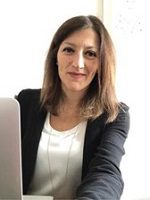
Elvira Buonocore is a Senior Researcher of Ecology at the Department of Science and Technology of Parthenope University of Naples, Italy. She holds a PhD in “Environment, Resources and Sustainable Development” with label of Doctor Europaeus.
Her research activities take place at the laboratory of “Ecodynamics and Sustainable Development” and the UNESCO Chair laboratory on “Environment, Resources and Sustainable Development” at Parthenope University where she contributes to research projects and academic supervision of Bachelor, Master, and PhD students. Her main research interests are: Systems ecology and ecological modelling, Human ecology, Environmental assessment and accounting, Life Cycle Assessment, Natural capital and ecosystem services assessment, Nature conservation and protected areas, UNESCO-MAB Biosphere Reserves, Urban metabolism and Food security, Sustainable Development Goals (SDGs).
Sara Cantone
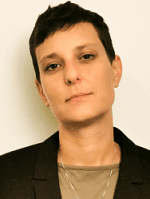 Sara Cantone has a background in Pharmaceutical Chemistry and Technology, start-upper in the field of green chemistry, nowadays working as consultant in the private and public sector for the development of collaborations, implementation of projects, and training activities, with a specific focus on the circular bioeconomy.
Sara Cantone has a background in Pharmaceutical Chemistry and Technology, start-upper in the field of green chemistry, nowadays working as consultant in the private and public sector for the development of collaborations, implementation of projects, and training activities, with a specific focus on the circular bioeconomy.
Holger Gerdes
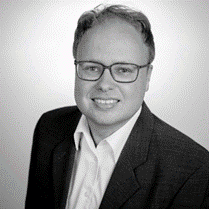
Holger Gerdes is a Senior Fellow at Ecologic Institute and coordinator of the Institute’s bioeconomy activities. He evaluates and applies participatory tools for effective natural resource management in the emerging bioeconomy. Currently, Holger Gerdes coordinates the project “Concepts, Tools and Applications for Community-driven Bioeconomy Development in European Rural Areas” (SCALE-UP), funded under the Horizon Europe programme. Before, he coordinated the Horizon 2020 projects “Bio-based Strategies and Roadmaps for Enhanced Rural and Regional Development in the EU” (BE-Rural) and “Promoting Stakeholder Engagement and Public Awareness for a Participative Governance of the European Bioeconomy” (BioSTEP). He is also responsible for Ecologic Institute’s contribution to the long-term research project “Sustainable Subsoil Management as Part of the Bioeconomy” (Soil³).
Francesc Giró
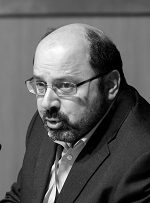 Francesc Giró i Fontanals, graduated in Agricultural Engineering, is currently the Director of Strategic Planning of the Waste Agency of Catalonia; all his professional career has been developed, as a technical expert and researcher in separate collection of biowaste and on biological treatment, between ESAB- Polytechnic University of Catalonia, as a researcher and teacher (1987-1993), and the Waste Agency of Catalonia, as a technician (1993-2011), deputy director (2011-2016) and Director of Strategic Planning (2016 up to now). He is also founder and member of the European Compost Network. Along more than 30 years, he has been working with high commitment to develop and promote the implementation of the biowaste separate collection and recycling. Last years he has coordinated the elaboration of the “Waste & Resources Prevention and Management Programme PRECAT20”.
Francesc Giró i Fontanals, graduated in Agricultural Engineering, is currently the Director of Strategic Planning of the Waste Agency of Catalonia; all his professional career has been developed, as a technical expert and researcher in separate collection of biowaste and on biological treatment, between ESAB- Polytechnic University of Catalonia, as a researcher and teacher (1987-1993), and the Waste Agency of Catalonia, as a technician (1993-2011), deputy director (2011-2016) and Director of Strategic Planning (2016 up to now). He is also founder and member of the European Compost Network. Along more than 30 years, he has been working with high commitment to develop and promote the implementation of the biowaste separate collection and recycling. Last years he has coordinated the elaboration of the “Waste & Resources Prevention and Management Programme PRECAT20”.
Barna Kovacs
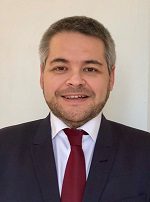 Barna Kovacs is currently working as counselor at the Permanent Representation of Hungary to the EU. He has been appointed as the Secretary General of the BIOEAST Initiative, as vice-chair of the FACCE JPI, and as SCAR member on behalf of Hungary. His responsibilities covers the follow up of the Council discussion with regard to the research and innovation in the field of bioeconomy
Barna Kovacs is currently working as counselor at the Permanent Representation of Hungary to the EU. He has been appointed as the Secretary General of the BIOEAST Initiative, as vice-chair of the FACCE JPI, and as SCAR member on behalf of Hungary. His responsibilities covers the follow up of the Council discussion with regard to the research and innovation in the field of bioeconomy
He worked previously as scientific and policy officer in the European Commission’s Directorate General Research and Innovation, Bioeconomy Strategy unit, for the European Parliament, and for the Hungarian Ministry of Agriculture and Hungarian Statistical Office. He holds a PhD degree from the Budapest University of Economic Science and Public Administration and his scientific background covers management and business administration focusing on the socio-economic aspects of agriculture, localized agri-food systems, food safety and security, as well as on the innovation aspects of origin labelled products.
Nora Szarka
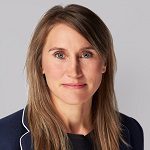 Nora Szarka is Group Leader at the German Biomass Research Center (DBFZ), in Leipzig, Germany. Before that she worked as a project engineer engineer at the Unidad de Desarrollo Tecnológico of the University of Concepción, Chile, and as a researcher at the Chair of Systems Analysis and Environmental Engineering of the University of Leoben, Austria. Her reasearch topics focus on the development of supply scenarios and utilisation strategies for bioenergy and bioeconomy in the medium and long term perspective; the method development and modelling of potential competing uses between biomass applications for material and energetic use; the system analysis of the demand-oriented provision of bioenergy; and the analysis and evaluation of bioenergy and bioeconomy technologies and supply chains.
Nora Szarka is Group Leader at the German Biomass Research Center (DBFZ), in Leipzig, Germany. Before that she worked as a project engineer engineer at the Unidad de Desarrollo Tecnológico of the University of Concepción, Chile, and as a researcher at the Chair of Systems Analysis and Environmental Engineering of the University of Leoben, Austria. Her reasearch topics focus on the development of supply scenarios and utilisation strategies for bioenergy and bioeconomy in the medium and long term perspective; the method development and modelling of potential competing uses between biomass applications for material and energetic use; the system analysis of the demand-oriented provision of bioenergy; and the analysis and evaluation of bioenergy and bioeconomy technologies and supply chains.
John Vos
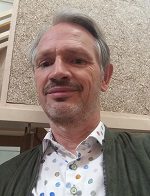 John Vos is a senior consultant with a background in business management and over 30 years of experience in the bioenergy and bioeconomy sectors. He is involved in the initiation, formulation, implementation and management of international collaboration projects, with a special emphasis on EU-funded projects. John has a track record working on studies and projects that seek to inform stakeholders from all parts of society (chemical industry, public procurers, brand owners, citizens, youngsters et cetera) about the opportunities offered by the bioeconomy and/or support the market uptake of fuels, materials and products derived from biomass. He is currently coordinator of the H2020 project MUSIC (facilitating the market uptake of intermediate bioenergy carriers) and the BBI JU project Tech4Biowaste (developing a database on bio-waste valorisation technologies). He is a task leader in the ongoing BBI JU projects BIOSWITCH and Allthingsbio.PRO which role he will also have in the upcoming bioeconomy governance projects BioGov.Net and GenB.
John Vos is a senior consultant with a background in business management and over 30 years of experience in the bioenergy and bioeconomy sectors. He is involved in the initiation, formulation, implementation and management of international collaboration projects, with a special emphasis on EU-funded projects. John has a track record working on studies and projects that seek to inform stakeholders from all parts of society (chemical industry, public procurers, brand owners, citizens, youngsters et cetera) about the opportunities offered by the bioeconomy and/or support the market uptake of fuels, materials and products derived from biomass. He is currently coordinator of the H2020 project MUSIC (facilitating the market uptake of intermediate bioenergy carriers) and the BBI JU project Tech4Biowaste (developing a database on bio-waste valorisation technologies). He is a task leader in the ongoing BBI JU projects BIOSWITCH and Allthingsbio.PRO which role he will also have in the upcoming bioeconomy governance projects BioGov.Net and GenB.